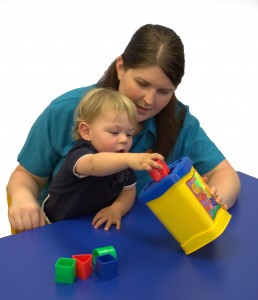
Eighteen month olds are becoming active and sociable. They are learning to use and understand words but still rely on gestures and tone to make their meaning clear. They are copying lots of things from adults, both words and actions and so are like little sponges, ready to learn. Here are some ideas to develop your child’s communication skills.
18 month olds should be using between 10 and 20 words and may be beginning to use short phrases such as “all gone” and “what’s that”. They can point to familiar things when asked and follow simple instructions. Their speech should include a range of different speech sounds though they may not be clear to unfamiliar listeners. They still use babble, pointing, gestures and tone to add extra meaning to their words when trying to express themselves. They will copy words from adults.
By 18 months children can:
- use 10 to 20 simple words or phrases
- follow simple instructions “find your shoes”
- point to familiar pictures in books
- point to simple body parts
- wave or say hello and bye
- give objects when asked “ta”
- try to copy new words
- point to things they want but can’t say
- ask “what’s that” with words or by pointing
- respond to their name
- make eye contact when spoken to and respond with words or babble
- use pointing, tone of voice and gestures to make their meaning understood
- understand simple words such as “stop” and “no”
To help your child develop language skills:
1. Build a bank of new words. Children at this age absorb new words rapidly. Tell your child the name of things they come into contact with. Name items around the house, things your child sees in books, things you give your child to play with or eat. Repeat words a few times to help your child remember them.
2. Put your child’s thoughts into words. If your child communicates with you through pointing, gesture or tone of voice give them a word for what they are trying to say. They may try to copy but if not they may use the word later on.
3. Expand the single words your child does say by adding another word. Try to repeat it a couple of times if you can. Sometimes you might add another word you know they can say or you might add a new word. Your child does not need to copy you, just hearing what you say will help and they will use that phrase when they are ready. If they do try to copy you though, respond positively.
4. Practice games and activities where you can repeat words over and over a number of times. Toddler’s love repetition and learn from it. They are happy to look at the same book, or do the same puzzle many times. They are happy to build and knock down blocks over and over, play peekaboo or put teddy in and out of bed many times over. By pairing repetitive games with words you give your child lots of chances to learn these words.
Some great activities for toddlers include:
- Stacking blocks: up, up, up, down
- Hiding and finding games: where’s teddy, there’s teddy
- Simple rhymes and songs that can be sung over and over
- Bright, sturdy books
- Shape sorters: in, in, in out
- Simple wooden puzzles
- Toys with lights and noises
- Toys for pretending such as dolls, pots and pans, cars and trucks, animals
5. Introduce simple pretending. Use simple, familiar toys such as dolls or teddy’s with plastic food, cups and plates and a blanket for pretend feeding and sleeping. Use items from around the house such as bowls and spoons for pretending to cook. Encourage your child’s natural tendency to copy what they see you do and add some words as you play.
Important tips for helping your toddler learn:
Get down to your child’s level, play face to face with lots of eye contact.
Copy what your child does and this will encourage them to copy you
Repeat, repeat, repeat: Repeat words, activities, stories and songs
Start where your child is and gradually move them forward. Start with the words you child can use and gradually add new ones. Start with toys and activities they can do and gradually add new ones. Start with books and songs they know and gradually add new ones.
Follow your child’s interests. Watch what they like, what they choose and what makes them light up. Use these things to help them learn
Care for your child’s hearing. Follow up on ear infections and ask to see a specialist if your child has more than three ear infections in a year.
If you are concerned about your child’s communication a speech pathologist can help with an assessment, advice and ideas to help your child learn. For more information visit the Talking Matters Website. For more ideas and activities to develop language skills visit the downloads section of our website.
Most of all have fun!
Related posts:
The importance of play
Top 10 speech ideas
Learn with playdough
Top 10 language ideas
Talking with babies and toddlers
Related Blog Posts
If you liked this post you may also like:
Top 10 speech ideas
What is PDD-NOS?
Work 50/50 with ASD
Help with ADLs



